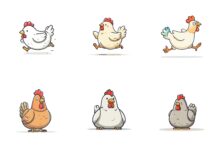Farming is a year-round endeavor that demands resilience, adaptability, and the right tools to ensure success. To keep operations running smoothly, farmers rely on a variety of farm machinery parts. In this article, we’ll explore essential farm machinery parts that are indispensable throughout the year to maintain productivity and efficiency.
1. Tractor Tires
Depending on the season, you may need different types of tires—such as radial tires for general use or flotation tires for wet conditions. Regularly inspecting and replacing worn-out tires is crucial to avoid downtime. If you’re looking for high-quality tractor tires, a reliable farming equipment store can help you find the right fit for your needs.
2. Hydraulic Hoses
Hydraulic hoses power various attachments and implements, such as loaders, plows, and harvesters. They transmit hydraulic fluid to create the force needed for lifting, pushing, and pulling. Over time, hoses can wear out due to exposure to weather, chemicals, and constant use. Checking for leaks, cracks, or bulges and replacing damaged hoses promptly can prevent costly breakdowns during critical farming seasons.
3. Power Take-Off (PTO) Shafts
PTO shafts are essential for transferring power from the tractor to implements like mowers, balers, and tillers. A damaged or malfunctioning PTO shaft can bring operations to a halt. Regularly lubricating the shaft and inspecting it for wear and tear can extend its lifespan. Keeping a spare PTO shaft on hand is also a smart move, especially during busy seasons.
4. Belts and Pulleys
Belts and pulleys drive everything from combines to irrigation pumps. They are subject to constant friction and tension. Regularly checking for cracks, fraying, or misalignment and replacing worn belts and pulleys can prevent unexpected equipment failures.
5. Filters (Air, Oil, and Fuel)
Filters protect your farm machinery’s engine and hydraulic systems from dirt, debris, and contaminants. Air filters ensure clean airflow, oil filters keep the engine lubricated, and fuel filters prevent clogs in the fuel system. Replacing filters at recommended intervals is important for maintaining optimal performance.
6. Blades and Cutting Edges
Blades and cutting edges are essential for implements like mowers, tillers, and plows. Dull or damaged blades can reduce efficiency and increase fuel consumption. Regularly sharpening or replacing blades ensures clean cuts and smooth operation. During planting and harvesting seasons, having sharp blades is particularly important for achieving the best results.
7. Bearings
Bearings are found in almost every piece of farm machinery, from tractors to combines. They reduce friction and enable smooth movement of rotating parts. Bearings wear out due to heavy loads and constant use. Regularly greasing and inspecting bearings can prevent premature failure and costly repairs.
8. Chains and Sprockets
Chains and sprockets are commonly used in equipment like conveyors, augers, and harvesters. These are subject to wear and tear, especially during heavy use. Regularly lubricating chains and checking for stretched links or worn sprockets can help maintain efficiency and prevent breakdowns.
9. Seals and Gaskets
Seals and gaskets are critical for preventing leaks in hydraulic systems, engines, and transmissions. Over time, they can degrade due to exposure to heat, chemicals, and pressure. Replacing worn seals and gaskets can prevent fluid leaks, leading to equipment damage and costly repairs.
10. Batteries
Batteries are essential for starting tractors, trucks, and other farm equipment. Cold winter temperatures are particularly harsh on batteries, reducing their performance and lifespan. Regularly checking battery terminals for corrosion, ensuring proper charging, and replacing old batteries can prevent starting issues during critical farming seasons.
Enhancing Your Farm with the Right Tools and Strategies
Investing in the right equipment and maintaining it properly can make all the difference. Here are some key strategies to enhance your farm operations:
1. Stay Informed About the Latest Equipment
Keep up with advancements in agricultural technology by staying informed about the latest innovations in farm equipment. Utilize resources like email newsletters, social media, and industry publications to learn about new tools that can improve your farming efficiency.
2. Diversify Your Equipment Inventory
Ensure you have a wide variety of equipment to handle different tasks, from planting and irrigation to harvesting and storage. Partnering with reliable suppliers or exporters can help you access high-quality machinery from around the world.
3. Prioritize Quality and Fair Pricing
High-quality machinery may come at a higher upfront cost, but it pays off in the long run with fewer breakdowns and longer lifespans. Ensure you’re getting fair pricing by comparing options and negotiating with suppliers.
4. Focus on Popular and Reliable Equipment
Invest in equipment that has a proven track record of reliability and performance. Choosing popular and trusted machinery can save you time and money. Look for customer reviews, testimonials, and case studies to guide your decisions.
5. Extend the Life of Your Equipment
Proper maintenance extends the life of your farm equipment. Regularly inspect and service your machinery, and educate yourself or your team on best practices for upkeep. Consider attending workshops or tutorials, and invest in maintenance kits to keep your tools in top condition.
6. Adapt to Agricultural Trends
Invest in equipment that incorporates advanced features like precision farming, GPS technology, and sustainable farming practices. Staying ahead of trends can improve your farm’s efficiency and reduce environmental impact.
How to Choose Essential Farm Machinery Parts for Every Season
Choosing the right farm machinery parts for each season is key to maintaining equipment performance and maximizing productivity. Here’s how you can select essential parts based on the seasonal needs of your farm:
1. Understanding the Seasonal Demands
Choosing the right farm machinery parts for each season is key to maintaining equipment performance and maximizing productivity. The seasonal demands of farming vary throughout the year, and understanding these needs will help ensure that your machinery is equipped with the proper parts for optimal operation.
2. Spring: Preparing for Planting
In spring, the focus is on parts needed for planting and early crop care, such as seeders, planters, and irrigation systems. During this season, it’s crucial to prioritize parts like seed tubes, discs, and belts for seeders, as well as fertilizer injectors or spreaders.
Additionally, sprayer nozzles and filters should be checked or replaced, ensuring that crops receive adequate care during the early growing season.
3. Summer: Maintaining Equipment for Growth Stages
In summer, maintenance parts are needed for tasks like cutting hay, mowing, and irrigation. As the growing season progresses, equipment is put under heavy use. Common parts that require attention in the summer include mower blades, air filters, and fuel filters to ensure smooth operation for tasks like hay cutting. It’s also a good time to check irrigation hoses, valves, and pumps to make sure they’re functioning properly, along with tractor tires and belts for general farm tasks.
4. Fall: Preparing for Harvesting and Storage
Attention shifts to harvesting and post-harvest care. It’s important to ensure that combine harvesters, storage equipment, and grain handling tools are in good condition. Additionally, grain augers and conveyors should be checked for wear and tear, and storage bins, air conditioning, and cooling systems should be prepared for grain storage.
5. Winter: Preventive Maintenance and Storage Preparation
In winter, preventive maintenance and preparation for storage become the priority. Cold weather can be harsh on farm machinery, so it’s essential to focus on maintaining equipment during the off-season.
Battery maintenance, such as using trickle chargers, is important to keep machinery ready for use in spring. Check the engine oil and coolant to ensure they’re suitable for colder temperatures, and parts like bearings, seals, and lubricants should be replaced to prevent freezing. Tire and undercarriage inspections are also essential to prepare for snow or muddy conditions that can arise during winter months.
Frequently Asked Questions (FAQ)
1. How can I ensure I’m getting a fair price on farm machinery?
To get the best value for your investment, compare prices from different suppliers, look for exclusive promotions, and negotiate based on the quality of the machinery. Focus on finding a balance between price and reliability, and always check reviews and testimonials before making a purchase.
2. Where can I find exclusive promotions for agricultural machinery?
Many farm equipment manufacturers and exporters offer exclusive promotions or discounts at different times of the year. It’s a good idea to subscribe to newsletters, follow companies on social media, or directly contact suppliers to inquire about any special offers or seasonal sales.
3. What models of agricultural equipment should I consider?
Choosing the right models of agricultural equipment depends on your specific needs and farm size. Popular equipment models from major farm equipment brands, such as John Deere, Case IH, and New Holland, are well-known for their reliability and advanced features. Be sure to match the equipment to the tasks you need to perform, whether it’s planting, irrigation, or harvesting.
4. What are the most popular pieces of farm equipment?
Some of the most popular equipment includes tractors, combines, plows, balers, and harvesters. These are essential for day-to-day farming operations. You should also consider material handling equipment for efficient storage and transportation of crops.
5. Can I buy construction equipment for my farm needs?
Yes, construction equipment can be used on farms, especially for tasks like building farm structures, roads, or irrigation systems. Equipment such as bulldozers, backhoes, and skid-steer loaders can be invaluable for larger agricultural projects.
Bottom Line
Farm machinery is the backbone of modern agriculture, and keeping it in top condition is essential for success. Regular inspections, timely replacements, and proper maintenance can save time, money, and effort, allowing farmers to focus on what they do best—growing food and sustaining livelihoods.






